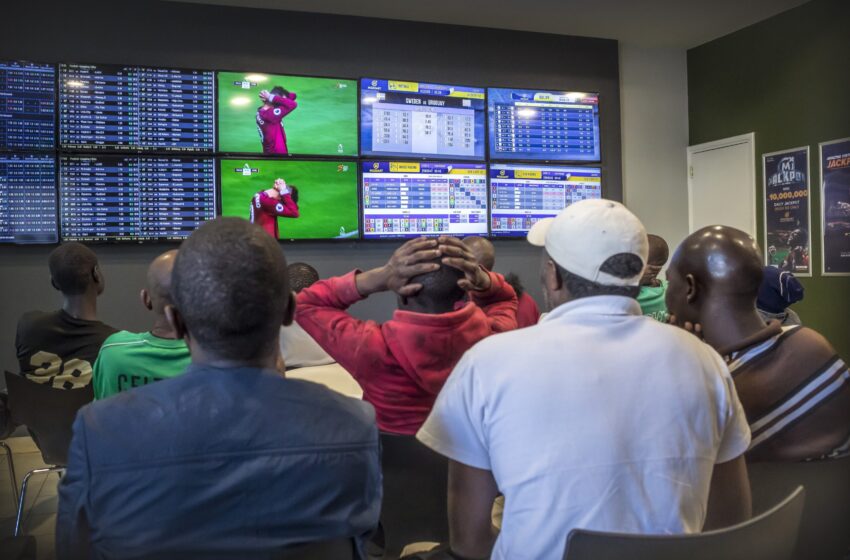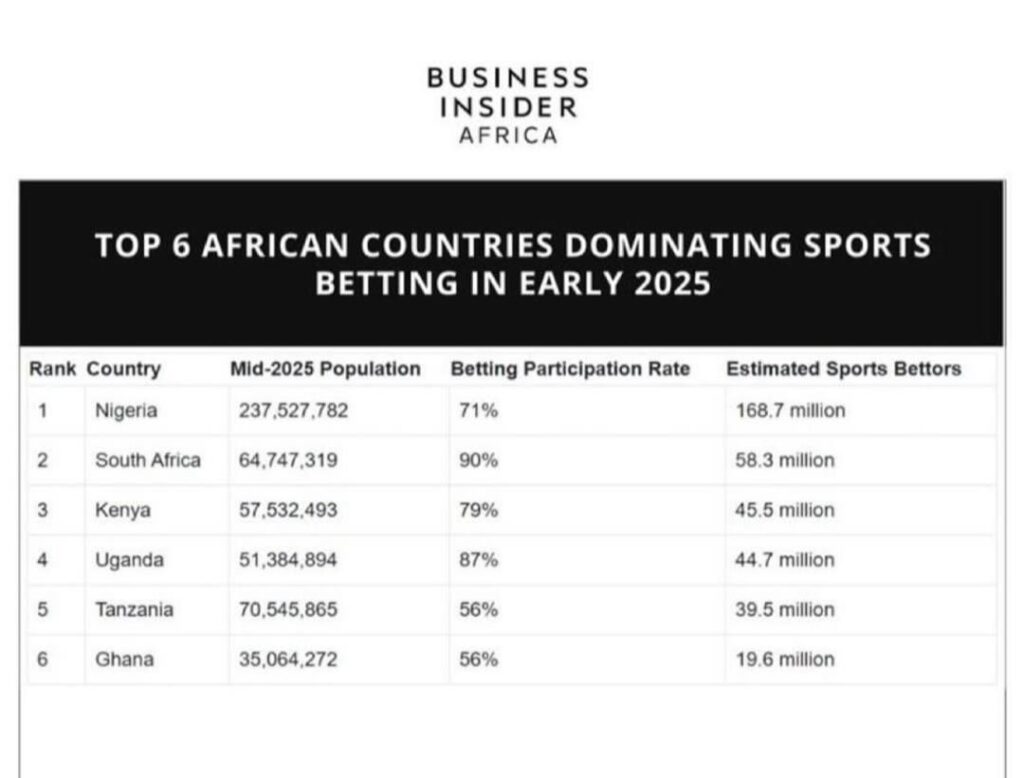Nigeria’s Betting Boom: Sports gambling rise in a nation at odds

Nigerian punters at a gambling shop. Photo Credit- Rest of the World
Nigeria stands as Africa’s betting powerhouse, dominating the sports gambling scene with an astonishing 168.7 million estimated bettors, according to a recent Business Insider Africa report. This figure, derived from a mid-2025 population of 237.527 million and a 71% betting participation rate, highlights a cultural shift that has turned sports betting into a national entertainment amid economic hardship and insecurity. As the country grapples with hyper-inflation and over 735 mass abductions since 2019, the betting boom raises questions about its social impact, economic implications, and whether it offers hope or despair to a nation at odds with itself. This piece is set to explore Nigeria’s ascent to the top of Africa’s betting charts and the complex reality behind the numbers.
How Nigeria leads in sports betting

The Business Insider Africa report, released in early 2025, ranks Nigeria first among the top six African countries dominating sports betting, outpacing South Africa (58.3 million bettors), Kenya (45.5 million), Uganda (44.7 million), Tanzania (39.5 million), and Ghana (19.6 million). With a mid-2025 population of 237.527 million and a 71% participation rate far exceeding South Africa’s 90% across a smaller 64.747 million population. Nigeria’s 168.7 million gamblers represent a staggering 71% of its populace engaging in the activity. This dominance is fueled by the propaganda of betting platforms like Bet9ja and SportyBet, which offer easy access via mobile phones, a lifeline in a country where 70% live below the poverty line.
The rise is evident on the streets of Lagos, Port Harcourt, Delta and Abuja, where betting shops buzz with activity. Nigerians have testified that betting betting is a quick fix, an easy escape room from poverty, unemployment, capturing the desperation driving this boom.
RELATED STORIES
Sports Betting in Nigeria: A Crime or a Legitimate Industry?
Opinion: How Sports Can Address Nigeria’s Insecurity, Promote Peace, Economy
Harnessing sports, Nigeria’s untapped goldmine for economic development
Sports gambling amid national crisis
Nigeria’s betting surge is both a symptom and a response to its crises. Economic hardship, worsened by the naira’s depreciation and spiking fuel prices, has pushed citizens toward gambling as a survival strategy. Insecurity and ethnic tensions has forced citizens to seek distractions which gambling can readily offer. However, this shift has cultural roots too. Traditional games of chance have evolved into modern betting, blending with Nigeria’s youthful energy over 60% of the population is under 30 (UNFPA). The Business Insider Africa report suggests this demographic drives the 71% participation rate, but it also raises concerns. A 2024 Punch investigation found that 65% of punters are youth aged 18-35, many risking school fees or rent, a trend mirrored in South Africa, where betting addiction has strained families.
The dark side of sports gambling in Nigeria
The betting boom has a darker edge, with addiction and exploitation threatening Nigeria’s social fabric. The National Lottery Regulatory Commission (NLRC) reported a 30% rise in gambling-related complaints in 2024, with 1.2 million Nigerians seeking help for addiction, per a 2025 Guardian study. Financial losses, wiping out personal savings, are not unique. The NLRC’s reduced oversight, coupled with betting firms’ aggressive marketing, promotes the issue, offering loans that trap users in debt cycles.
Economic implications of sports gambling
Economically, betting offers both promise and peril. The NLRC estimates the industry generated N500 billion ($326 million) in 2024, creating 150,000 jobs. Tax revenues, projected at N50 billion annually, could bolster a strained economy. Financial experts suggest betting could fund development. Yet, this pales against losses with billions of household income lost to gambling, a far difference from the gains and deepening poverty.
Conclusion
Nigeria’s betting boom is an irony, a source of hope for some, a harbinger of despair for others. The industry’s impact on youth: 65% of punters are under 35 raises alarms about education and stability, especially in a nation with glaring poverty, insecurity, and unemployment. The government must act: regulate betting, enforce age restrictions, and channel revenues into meaningful social services like education and health. If harnessed wisely, it could lift the nation; if ignored, it risks sinking it deeper into crisis. The choice is Nigeria’s to make before the odds turn irrevocably against its people.

